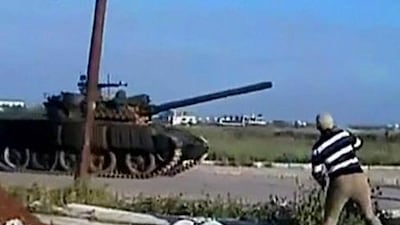DAMASCUS // Tanks and infantry units swept into Deraa yesterday as the Syrian authorities moved to crush an anti-government uprising, civil rights activists and analysts said.
Deraa, the epicentre of more than five weeks of nationwide demonstrations, was sealed off yesterday morning and news from inside the city remained tightly limited by last night. Human rights workers said they lost contact with residents when mobile phone networks were shut down.
Before the blackout, there were reports of rooftop snipers shooting at civilians, and of artillery shells hitting residential areas. Video footage posted on the internet showed tanks, backed by large forces of soldiers in full combat gear, approaching the city's outskirts. Later, a tower of black smoke was seen rising above the city.
With the area sealed off there was no way of independently verifying exactly what was taking place in Deraa, roughly 100 kilometres south of Damascus.
"The authorities have decided on a military solution, whatever the cost," said Abdul Karim Rehawi, head of the Syrian Human Rights League. "We don't know how many people have been killed yet."
Ammar Qurabi, a leading Syrian human rights activist, said his organisation had confirmed five people dead, after soldiers opened fire on a car.
Abdullah Abazid, an activist inside Deraa, told Al Arabiya television that "at least" 25 people had been killed, and that bodies had been left in the streets because family members were too scared to collect them, fearing sniper fire. He also claimed some soldiers had deserted their units after refusing orders to open fire on unarmed civilians.
State television quoted a military official as saying troops entered the city at the request of citizens to hunt "extremist terrorist groups."
"The army is now pursuing these groups with the help of the security forces and has arrested several of them and seized large quantities of weapons and ammunition," a statement said.
Syrian authorities said the Syria-Jordan border crossings, both of which are near Deraa, remained open. The Jordanian government had earlier issued a statement saying Syria had closed the border.
The Syrian army's general command said seven soldiers had been killed in an attack on Sunday by "armed criminal groups" in Nawa, close to Deraa. The government claims it is fighting an "insurrection" by Islamist militants armed and funded by "foreign" agents.
Military units and security forces also carried out raids yesterday and Sunday in the Damascus suburbs of Douma and Maadamiyah, and in Jableh, a town on the Mediterranean coast where pro-government gunmen killed 13 people, according to human rights monitors.
A wave of arrests also continued, activists said, with protesters being detained from their homes in Idlib, Deir Ezzor and Raqqa.
Last week, President Bashar al Assad issued a decree to end 48 years of martial law and restore a civilian judicial system, part of a package of what his supporters say it a sweeping series of political reforms.
With detentions of political activists continuing and security units using live ammunition against peaceful protesters, civil rights monitors said nothing had actually changed.
"The state of emergency has been lifted in a legal sense but in reality the situation is the same as it always has been," said Mr Rehawi, of the Syrian Human Rights League.
The government last week acknowledged the right of Syrians to peacefully demonstrate - something that had been illegal under martial law - but on Friday, more than 100 people were killed at public protests across the country by security units, according to political activists and civil rights groups.
That bloody day - the deadliest since demonstrations began - and subsequent shootings of mourners at funerals brought the number of civilian dead in Syria's uprising to more than 300, rights groups said.
For weeks, Syrian state media has made no mention of any civilian casualties, insisting the country is the target of a conspiracy by foreign media outlets to fabricate reports of massacres. It has, however, shown extremely graphic images of dead policemen and soldiers, and says that more than 280 have been killed or injured since protests began. Protesters have posted shocking images of their own dead on internet sites.
"The political leadership have chosen the military solution but it remains to be seen if that can succeed this time," a Syrian political analyst said on condition of anonymity. The military previously used force to smash an Islamic militant revolt in the 1980s, at the cost of thousands of lives and the destruction in the city of Hama.
"They will want to crush this [uprising] this week. They'll want to get it done before Friday," the analyst continued. "They don't want any more demonstrations. They want to say this is over."
Friday has become a rallying point for dissidents, who have taken to the streets in the thousands, defying a security crackdown to call for reforms.
As the bloodshed has intensified, so too have protests, with demonstrators expanding their demands. Where initially they been pushing for greater civil rights, increasingly they are calling for the entire autocratic system of government, ruled by the al Assad family and the Baath party for some 40 years, to be dismantled.
Yesterday more than 100 leading Syrian writers and journalists issued a statement against the authorities. "We condemn the violent, oppressive practices of the Syrian regime against the protesters and mourn the martyrs of the uprising," read the statement.
Yet the vast majority of Syria's 23 million population has remained silent, apparently supporting the president and accepting his assurance that real political reforms are underway.

